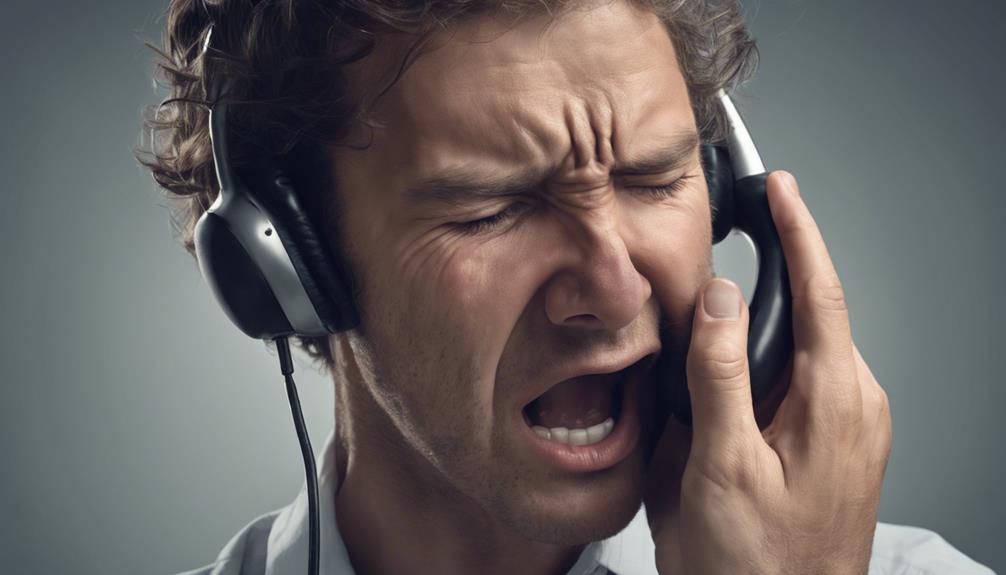Ever curious about whether your ears aren’t catching sounds like they used to? Spotting those first hints of hearing slipping is key to jumping into action for healthier ears.
From struggling to hear conversations in noisy environments to constantly having to ask for repetitions, understanding these subtle indicators can help you address potential issues before they worsen.
Stay tuned to discover simple yet effective ways to assess your hearing and seek the necessary support to preserve your auditory abilities.
Key Takeaways
- High-pitched sounds affected first, indicating early signs of hearing loss.
- Increased volume on electronic devices can signal declining hearing abilities.
- Ringing in ears and sound perception changes may indicate potential hearing loss.
- Difficulty following conversations and challenges in communication are common signs of hearing deterioration.
Early Signs of Hearing Loss
Early signs of hearing loss may manifest subtly, affecting one's ability to hear high-pitched sounds like children's voices or birds chirping. These sounds are typically in the higher frequency range and are often some of the first to be impacted when hearing loss begins. Individuals may notice a gradual reduction in their ability to pick up these sounds clearly, leading to a sense of distortion or muffled quality in what was once easily audible.
As hearing deteriorates, the brain struggles to process these specific frequencies, causing difficulties in distinguishing speech, music, or environmental cues. This early indicator of hearing loss can be especially concerning because it can hinder communication and social interactions, impacting overall quality of life. Therefore, recognizing and addressing these subtle signs promptly can be crucial in managing potential hearing issues before they progress.
Regular check-ups with an audiologist and proactive measures such as using hearing protection in noisy environments are essential steps in preserving auditory health.
Difficulty Following Conversations

As hearing loss progresses, individuals may find themselves struggling to actively participate in conversations, especially in noisy environments, which can be a significant indicator of potential hearing difficulties. Difficulty hearing and understanding conversations, particularly when there's background noise, is a common early sign of hearing loss.
This difficulty can manifest as finding it hard to follow discussions or group conversations, needing frequent repetitions from others, or struggling with rapid or overlapping speech in social settings. These challenges in communication can lead to feeling left out or disconnected from conversations, potentially signaling a decline in hearing acuity.
If you notice yourself having to ask others to repeat themselves often or if you feel like you're falling behind in conversations, it may be time to consider getting your hearing checked. Addressing hearing issues early can help prevent further deterioration and improve your overall quality of life.
Increased Volume on Electronic Devices
If we constantly find ourselves turning up the volume on our devices to hear clearly, this could indicate potential hearing loss.
Hearing difficulties might lead us to require higher volumes, especially in noisy environments where background noise can interfere.
Being mindful of consistently needing louder volumes on our electronics can serve as an early warning sign of declining hearing abilities.
Device Volume Adjustment
Increasing the volume on electronic devices such as TVs, phones, and radios can serve as an early indicator of potential hearing loss. When contemplating device volume adjustments, consider the following:
- Sign of Hearing Loss: Needing higher volume levels than before to hear clearly suggests a decline in hearing sensitivity.
- Consistent Adjustment: Continuously tweaking device volume upwards may be a sign of hearing impairment.
- Prompted Volume Increase: Difficulty hearing at normal volume settings may prompt individuals to raise the volume.
- Early Detection: Monitoring changes in volume preferences on devices can help identify early signs of deteriorating hearing.
Being mindful of these factors can aid in recognizing changes in your hearing health and seeking appropriate support.
Difficulty Hearing Conversations
Transitioning from adjusting device volumes to address hearing concerns, experiencing difficulty hearing conversations despite increased volume on electronic devices may indicate potential hearing loss. When background noise makes it hard to distinguish speech, people with hearing loss may find themselves constantly increasing the volume on their devices.
Struggling to follow conversations in noisy settings and needing others to speak louder can be early signs of hearing impairment. Additionally, the reliance on high volumes during phone calls to hear clearly suggests a deterioration in hearing ability.
If these challenges persist, seeking a hearing evaluation from a professional is crucial to address any potential hearing loss promptly. Taking proactive steps can significantly improve the quality of life for individuals experiencing these difficulties.
Ringing in Ears
Experiencing a persistent ringing or buzzing in the ears, especially in the absence of external noise, may indicate a potential decline in hearing health. Here are some key points to consider regarding ringing in the ears, also known as tinnitus, and its relation to hearing loss:
- Tinnitus, often perceived as a high-pitched noise or buzzing, can be a sign of underlying hearing issues.
- Increased volume settings on electronic devices, like phones or TVs, might be a result of hearing loss, prompting the need for louder sounds.
- The presence of persistent ringing or buzzing, especially without external stimuli, could signal deteriorating hearing health.
- Difficulty hearing softer sounds over the ringing may suggest a decline in auditory function, warranting professional evaluation.
Ringing or Buzzing in Ears

Ringing or buzzing in the ears, known as tinnitus, can serve as an early indicator of potential hearing loss. Tinnitus presents itself as a persistent sound such as ringing, buzzing, hissing, or roaring in the ears. The intensity and frequency of tinnitus can vary from person to person, impacting individuals differently. This condition often signifies underlying issues like age-related hearing loss or exposure to loud noises.
Age-related hearing loss, also known as presbycusis, is a common cause of tinnitus, where the sensory cells in the inner ear deteriorate over time. Exposure to loud noises can damage the delicate structures of the inner ear, leading to hearing problems and tinnitus.
If you experience persistent tinnitus, seeking medical evaluation is crucial to identify the root cause and explore suitable treatment options. Early detection and management of tinnitus can help prevent further hearing deterioration and enhance your overall quality of life.
Muffling of Speech and Sounds

We might notice that speech sounds become muffled, making it challenging to hear clearly. This difficulty may lead to sounds seeming quieter or more distant than they actually are.
When faced with these signs, it's crucial to consider the possibility of hearing loss and seek professional evaluation promptly.
Speech Sounds Muffled
When hearing loss occurs, speech sounds may become muffled or unclear, posing challenges in understanding words and sounds. Here are some key points to consider:
- Distorted Speech: Hearing loss can lead to speech sounds being distorted, making it difficult to grasp the full meaning of conversations.
- Misunderstandings: Misinterpreting words or phrases due to muffled speech sounds can result in misunderstandings in communication.
- Impact on Relationships: Struggling to hear clearly may impact relationships as conversations become strained or frustrating for both parties.
- Seeking Assistance: It's essential to seek help from a healthcare professional if you notice speech sounds becoming muffled, as early intervention can help manage the effects of hearing loss effectively.
Difficulty Hearing Clearly
Experiencing difficulty in hearing clearly, particularly through the muffling of speech and sounds, can be an early indication of potential hearing loss. When speech sounds are muffled or if sounds seem distorted, it could signal issues within the inner ear.
Exposure to loud noises over time can harm the delicate hair cells in the inner ear responsible for transmitting sound signals to the brain. This damage can lead to difficulties in hearing and understanding speech clearly.
If you find yourself struggling to hear conversations, especially in noisy environments, it's essential to seek a hearing evaluation promptly. Addressing hearing problems early can prevent further deterioration and enhance your overall quality of life.
Sound Seems Quieter
If sounds around you begin to appear quieter or muffled, it could be a sign of potential hearing loss. This change can affect how you perceive speech and the world around you. Here are some key points to consider:
- Decreased Perception: Difficulty in hearing high-pitched sounds like children's voices or microwave beeps could indicate a decline in auditory acuity.
- Inner Ear Impact: Deterioration of the inner ear organ, whether from aging or exposure to loud noise, can lead to a background perception of quieter sounds.
- Voice Clarity Changes: Initial impacts may include challenges in understanding voices, especially those of children and women, highlighting shifts in sound perception.
- Progressive Nature: If you notice a consistent decrease in sound clarity or volume, it might signal a progressive hearing loss that needs attention.
Avoidance of Social Situations

Struggling to hear in social settings can lead to feelings of isolation and a reluctance to participate in group activities. When faced with difficulty hearing and understanding conversations, individuals may find themselves avoiding social situations to escape the frustration and embarrassment that can come with not being able to follow along. This avoidance can result in feeling isolated or left out in group settings, as well as a preference for staying home rather than engaging in social activities that involve listening.
To illustrate the impact of avoidance of social situations due to hearing challenges, consider the following table:
| Challenges in Social Situations | Effects |
|---|---|
| Difficulty hearing conversations | Feeling isolated |
| Struggling to keep up with multiple speakers | Social withdrawal |
| Not enjoying gatherings due to effort to follow conversations | Reluctance to participate |
It is essential to address hearing difficulties promptly to prevent the negative consequences of avoiding social interactions.
Struggling in Noisy Environments

In noisy environments, we may struggle to hear conversations clearly, especially when high-pitched sounds become harder to distinguish. Difficulty in following discussions amidst background noise could point towards potential hearing loss.
This can lead to challenges in communication, potentially causing individuals to withdraw from social situations.
Noise Sensitivity Signs
Experiencing difficulty following conversations in noisy environments like restaurants or parties is a common sign of noise sensitivity related to potential hearing loss. When noise sensitivity becomes an issue, individuals may also struggle with:
- Sensitivity to loud noises such as sirens, alarms, or construction sounds.
- Struggling to hear clearly when there's background noise present.
- Feeling overwhelmed or fatigued in environments with high levels of noise.
- Finding it challenging to filter out background noise and focus on specific sounds or voices.
These signs can indicate a need to address potential hearing loss and seek appropriate interventions to improve quality of life and communication abilities.
Communication Difficulties Understanding
Navigating conversations in bustling environments can present significant challenges for individuals experiencing communication difficulties due to potential hearing loss. Struggling to follow discussions amidst background noise can be frustrating and isolating. Difficulty understanding speech sounds like 'f' and 's' in noisy settings may signal underlying hearing loss. Here is a table illustrating common communication difficulties individuals with hearing loss might encounter in noisy environments:
| Challenges | Examples |
|---|---|
| Difficulty following conversations | Straining to hear amidst loud chatter |
| Inability to discern speech sounds | Misinterpreting words like 'fat' for 'sat' |
| Trouble understanding phone calls | Finding it hard to grasp dialogue over the phone in noisy places |
| Increased reliance on visual cues | Watching lips to aid in understanding |
| Frustration with unclear speech | Repeatedly asking others to repeat themselves due to muffled speech |
Social Withdrawal Due
Struggling to engage in social interactions due to challenges in noisy environments can lead to feelings of isolation and frustration, potentially contributing to social withdrawal.
- In noisy settings, individuals with hearing loss may struggle to follow conversations, impacting their ability to connect with others.
- Difficulty hearing high-pitched speech sounds in crowded places like 'f' and 's' can lead to misunderstandings and feelings of exclusion.
- Age-related changes affecting speech comprehension in noisy environments can further exacerbate social withdrawal.
- Increased difficulty in filtering out background noise due to hearing loss can result in exhaustion during social interactions, prompting individuals to withdraw from noisy settings.
Family History of Hearing Loss

A family history of hearing loss can significantly increase the likelihood of developing deafness due to the influence of genetic factors. Genetic factors play a crucial role in determining an individual's susceptibility to hearing impairment. If there are close relatives who've experienced hearing loss, it may indicate a higher risk for others in the family to also develop similar issues. Understanding the genetic component of hearing loss is essential for proactive management and prevention strategies.
Regular monitoring is particularly important for individuals with a family history of hearing loss. Early intervention can help in managing any potential hearing issues effectively. By staying vigilant and seeking regular check-ups with healthcare professionals, individuals can address any hearing loss promptly. This proactive approach can lead to better outcomes and improved quality of life.
Being aware of one's family history and genetic predispositions can empower individuals to take control of their hearing health. By staying informed and proactive, individuals can mitigate the risks associated with hereditary hearing loss and take steps towards preserving their hearing abilities for the long term.
Impact of Aging on Hearing

With a family history of hearing loss potentially influencing genetic predispositions, understanding the impact of aging on hearing becomes crucial for maintaining optimal auditory health as individuals progress into their later years.
- Cells in Your Inner Ear: The cells in your inner ear, responsible for converting sound waves into electrical signals, can deteriorate over time, leading to age-related hearing loss.
- Hearing Specialist Consultation: Consulting a hearing specialist is essential as they can assess the extent of age-related hearing loss and recommend appropriate interventions.
- Challenges in Daily Activities: Aging can gradually impact daily activities due to a decline in hearing ability, making it harder to engage in conversations or follow instructions.
- Potential Need for Hearing Aids: As individuals age, the gradual decline in hearing ability may necessitate the use of hearing aids to maintain quality of life, enhance communication, and prevent social isolation.
Importance of Regular Hearing Check-Ups

Regular hearing check-ups are crucial for monitoring and maintaining auditory health over time. Scheduling these tests allows individuals to detect changes in their hearing ability early on, leading to timely interventions that can prevent further decline. Identifying issues like sudden hearing loss promptly is essential for better outcomes. Routine assessments also help in adjusting and optimizing hearing aids, if needed, to ensure optimal performance. By staying current with hearing evaluations, individuals can promptly address emerging concerns and improve their quality of life. Prioritizing regular hearing check-ups is key to maintaining healthy auditory function and addressing potential issues promptly.
Effects of Untreated Hearing Loss

Monitoring and addressing untreated hearing loss is crucial due to its potential negative impact on various aspects of one's life, including social interactions and cognitive health.
- Social Isolation: Untreated hearing loss often leads to social isolation as individuals may struggle to follow conversations or participate in group settings, making it harder to connect with others.
- Cognitive Decline: Research suggests that untreated hearing loss can contribute to cognitive decline and increase the risk of dementia. The brain works harder to interpret sounds, diverting resources from other cognitive functions.
- Relationship Strain: Untreated hearing loss can impact relationships, both personally and professionally, as misunderstandings may arise due to communication barriers. Individuals may need a hearing aid to improve communication.
- Emotional Effects: Emotional effects such as frustration, anxiety, and depression can result from untreated hearing loss. Struggling to hear and engage can take a toll on one's mental well-being.
Addressing hearing loss promptly can prevent further deterioration and significantly improve overall quality of life.
Seeking Professional Help

Seeking professional help for hearing loss is crucial in order to address potential issues and improve overall hearing abilities. Audiologists, ENT specialists, and hearing healthcare providers play key roles in diagnosing and managing hearing loss.
Audiologists are trained professionals who can conduct comprehensive assessments to determine the extent of hearing loss, offer expert advice on hearing health, and recommend appropriate treatment options such as hearing aids.
ENT specialists, on the other hand, specialize in diagnosing and treating conditions affecting the ear, nose, and throat. They can identify underlying medical issues contributing to hearing loss and provide medical interventions when necessary.
Hearing healthcare providers offer a range of services, including hearing tests, fittings for hearing aids, and ongoing support for individuals managing hearing loss. Timely intervention from these professionals can prevent further deterioration of hearing abilities and improve overall quality of life.
If you suspect any hearing difficulties, don't hesitate to reach out to audiologists, ENT specialists, or hearing healthcare providers for assistance.
Hearing Loss Prevention Tips

To protect your hearing from potential damage, it's important to implement effective strategies for preventing hearing loss. Here are some tips to help safeguard your hearing health:
- Avoid loud noises: Make sure to steer clear of environments where noise levels exceed 85 decibels for extended periods as noise can cause irreversible damage to your hearing.
- Use ear protection: When in noisy settings such as concerts or construction sites, wear earplugs or earmuffs to reduce the impact of loud sounds on your ears.
- Take breaks: Give your ears a break from loud activities to allow them time to recover and minimize the risk of hearing damage.
- Regular hearing tests: Schedule routine hearing tests, especially if you're exposed to loud noises at work or have a family history of hearing loss. These tests can help detect early signs of hearing loss and prevent further damage.
Frequently Asked Questions
How Can You Tell if Your Hearing Is Going Bad?
We can tell if our hearing is declining by noting difficulties with high-frequency sounds and following conversations in noisy places. Sensitivity to loud noises, frequent TV volume adjustments, and phone call challenges like misunderstanding are also common signs. Struggles in crowded environments due to unclear speech may indicate potential hearing loss. These signs could prompt seeking professional evaluation to address any issues and improve our hearing health.
What Are the Early Warning Signs of Hearing Loss?
Early warning signs of hearing loss include:
- Difficulty hearing high-pitched sounds
- Struggling in noisy environments
- Increasing volume on devices
- Feeling like people mumble
- Experiencing tinnitus
These indicators point to potential hearing problems that warrant attention. It's crucial to address these signs promptly to prevent further deterioration.
Regular hearing check-ups and proactive measures can help maintain optimal hearing health.
What Happens Right Before You Go Deaf?
Before going deaf, various signs may emerge, such as sudden hearing loss in one or both ears, gradual deterioration over time, or hearing loss coupled with symptoms like earaches. Recognizing these indicators and seeking immediate assistance is vital in preventing complete deafness.
Prompt action, like contacting 111 for urgent help with hearing issues, can play a crucial role in preserving your hearing capabilities and preventing further deterioration.
How Does Going Deaf Start?
As we explore how going deaf typically begins, we discover a journey that often starts with subtle shifts in our ability to hear high-pitched sounds. These initial changes can signify the onset of hearing loss.
Over time, challenges may arise in understanding speech clearly, especially in noisy environments.
Seeking professional evaluation early on can provide insight into the extent of any hearing impairment, guiding us towards appropriate interventions and support.
Conclusion
In conclusion, recognizing the signs of hearing loss early on is like tuning into life's symphony in perfect harmony.
By seeking help from healthcare professionals and staying proactive with regular check-ups, you can ensure that the music of the world remains crystal clear.
Don't let the sounds of life fade away – take action, protect your hearing, and keep enjoying the sweet melodies that surround us every day.










